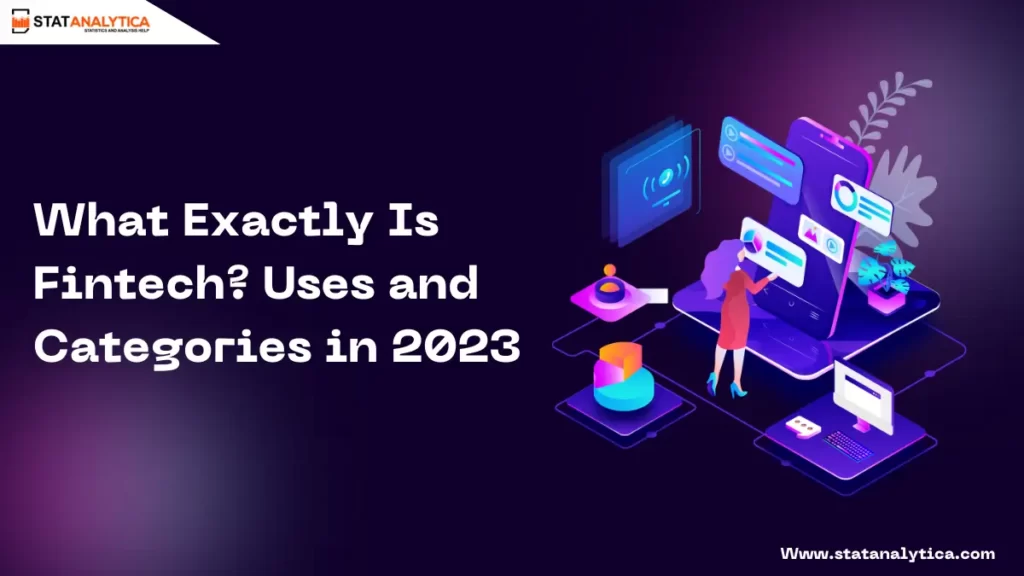Over the last several years, fintech companies have effectively changed every aspect of the financial industry. Ten years ago, to apply for a mortgage, a small business loan, or even just to transfer money from one bank to another, you had to visit a bank or other financial institution. Fintech has made it feasible to use online and mobile services to invest, borrow, save, and transfer money without ever setting foot inside a bank. Although conventional banks took their time implementing fintech solutions, both new businesses and well-established businesses are increasingly placing bets on digital financial services. Let’s learn more about what exactly is fintech.
What Exactly Is Fintech?
Table of Contents
The term “fintech” or financial technology, refers to any new technology that aims to improve and automate the use of financial services. With the use of sophisticated software and algorithms on smartphones and PCs, it helps both companies and individuals better manage their financial activities.
The phrase originally referred to the technology that banks and other financial organizations utilized in their back-end systems, but over time, its connotation has changed to include custom fintech software development that is geared toward consumers.
Fintech Categories
Fintech enabled conventional financial institutions like banks to prosper before the 1990s and the dawn of the Internet. According to the Federal Deposit Insurance Corporation, around 13,500 commercial bank branches existed in 1950, while there were over 83,000 in 2008. Online fintech companies like PayPal entered the market in the late 1990s and early 2000s, but they didn’t start to disrupt the existing infrastructure until the global financial crisis 2008. Many individuals began to lose faith in conventional banks during this period, while millennials embraced free and online financial services. These developments have changed how we manage and access financial services.
- Web APIs and Open Banking
Collaboration and innovation in the financial sector are now possible thanks to open banking efforts and the usage of application programming interfaces (APIs).
- Financial Planning and Asset Management
Personal financial management and wealth management services have significantly improved thanks to fintech. Users may manage investments, make budgets, and monitor spending using mobile applications and internet platforms.
- Automated Robotic Process (RPA)
RPA is a process that automates routine, rule-based processes for the financial sector. Software robots that imitate human behavior make it possible to automate procedures like data input, document verification, and compliance checks.
- Digital Transfers and Payments
Digital transfers and payments are one of the most well-known fintech applications. This covers a range of options, including peer-to-peer payment applications, mobile wallets, and internet payment gateways.
- Crowdfunding and Online Lending
Fintech has completely changed the lending business by providing online and crowdfunding platforms. Online lending platforms enable rapid and effective loan approval procedures by directly contacting borrowers and lenders.
- Neo-Banks and Online Banking
Digital banking has changed how people and companies engage with their financial institutions. Neo-banks, commonly referred to as challenger banks, are entirely digital financial institutions without physical branches.
The Use of Fintech
After knowing about What Exactly Is Fintech let’s check use of Fintech is changing the financial environment for consumers in many different ways. For instance, you may now create a bank account online without going to a physical location. You may use your smartphone to monitor your transactions by connecting the account to it. Even better, you can use your smartphone as a “digital wallet” to make purchases with funds from your account.
Fintech is causing rapid transformation in the insurance and investing industries. Car insurance providers now provide “telematics-based” insurance, which monitors your driving using information received from your smartphone or a “black box” put in your car. Using this information, you can then determine how much you will pay for your insurance coverage. In the future, insurance could be available on a “pay as you go” or momentary basis.
Ensuring Security and Privacy in Fintech Applications
Fintech is a fast-growing industry that’s changing the way we do business. It uses technology to improve financial services and can be used by companies, governments, and individuals. Fintech is a broad term that has many applications from cryptocurrencies like Bitcoin to mobile apps that help you manage your money better.
Fintech includes any financial service provided through an Internet connection or digital device (like smartphones). Some examples include online banking, mobile payment systems, and crowdfunding platforms.
The Role of Blockchain and Cryptocurrencies in Fintech Innovation
Blockchain and cryptocurrencies are evolving, and fintech is evolving to include them.
Blockchain is a digital ledger technology that allows for the creation of publicly available ledgers for recording transactions in a way that makes them immutable and verifiable by anyone in the network. Cryptocurrencies are digital currencies based on blockchain technology, which means they use cryptography to secure their transactions. Cryptocurrencies can be used as an alternative payment method or as an investment vehicle or both!
Conclusion
An innovation known as “fintech” combines the most recent technological advancements to enhance and automate the practice and provision of financial services. By making digital financial transactions more accessible and easy without requiring the use of a conventional bank, it has altered the methods in which we save, borrow, and invest money.
Also Read: Smart Side-Hustles: 13+ Business Ideas for Students Success


